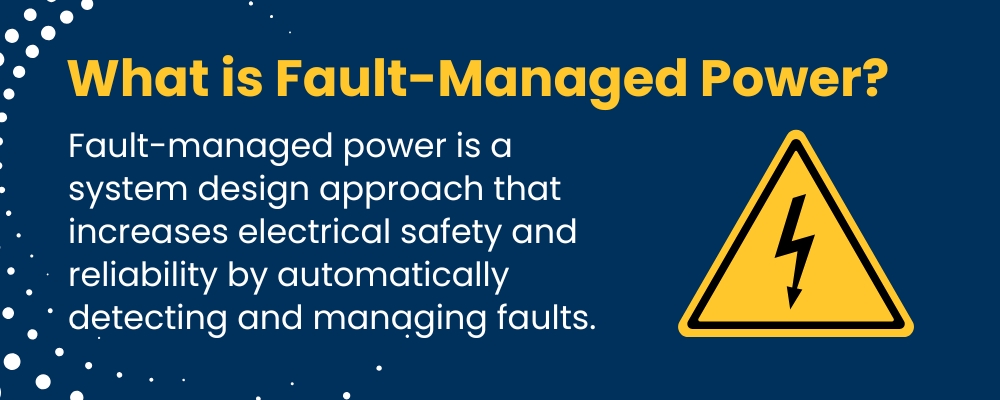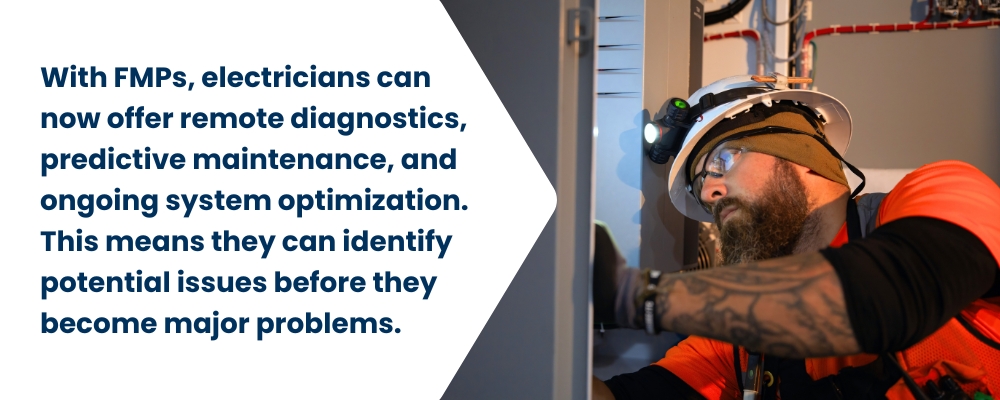Inside Fault-Managed Power: Evolving Standards, Smarter Installs, New Possibilities
Fault-Managed Power (FMP) is more than a breakthrough; it’s reshaping the future of electrical systems. As customer expectations rise and safety standards evolve, FMP is opening new doors for electrical professionals to grow their skills, services, and competitive edge. In this blog, we’ll break down how this emerging technology is transforming the way we deliver power and what it means for those leading the charge in the electrical industry.
What is Fault-Managed Power?

FMP is a system design approach that increases electrical safety and reliability by automatically detecting and managing faults. It works by:
- Converting traditional AC power to high-voltage DC
- Continuously monitoring for issues like short circuits or overloads
- Instantly shutting off only the affected area when a fault occurs
- Allowing power to keep flowing to unaffected parts of the system
- Reducing downtime and preventing equipment damage
- Supporting critical operations, such as keeping a data center online while isolating a single faulty server rack
How are FMPs Changing the Electrical Sector?
Historically, there have been three main NEC power classes, each with its unique applications and levels of energy limitations.
- Class 1: Widely adopted as a power system, Class 1 power has no limits, but it has higher instances of fire and shock, making precise, expert installation and maintenance crucial.
- Class 2: Often installed in commercial buildings, Class 2 power is known for its Power over Ethernet (PoE) capabilities. It does not require conduits and can be installed more easily. The power limit is 100 W and 60V.
- Class 3: Commonly implemented for home sound and theater, Class 3 power can be prone to shock risk, similar to Class 1. However, it poses less fire risk. The power limit is 100 W and 150V, and highly skilled electrical installation is a must.
What sets FMPs apart and makes their power circuits innovative is their ability to limit energy expenditure when a fault occurs. This unique feature has classified them as Class 4 power, revolutionizing the electrical sector. FMPs provide a more efficient and reliable power system that can adapt to modern energy demands and integrate with new technologies like renewable energy sources.
3 Benefits of FMPs for the Electrical Industry
Traditional power systems require a significant amount of energy consumption. The growth of data centers, the electrification of everything, and updating aging infrastructure cause a strain on the current power grid. Electricity demand projections show a 185% increase by 2050.
Fault-managed power is unique because it can integrate with renewable energy, self-monitor, improve safety, and maintain a continuous energy cycle, thereby reducing the need for older energy systems while meeting growing energy demands.
1) Superior Power Delivery
Unlike PoE, FMP delivers up to 2kW per pair of #16 AWG conductors over 500 feet, reaching up to 2 kilometers in some applications, without expensive conduit routing. This efficiency allows electrical contractors to offer competitive pricing and faster project completion, directly improving customer satisfaction.
2) Faster Installation
Fault-Managed Power (FMP) supports efficient wiring methods like cable trays and J-hooks, streamlining the installation process. While FMP allows technicians to handle certain aspects of the work, licensed electricians still play a key role in design, oversight, and system integration. The result is faster installs, reduced project timelines, and greater flexibility, giving electricians the opportunity to take on more projects and deliver added value to clients.
3) Advanced Safety and Monitoring
FMP transmitters continuously verify signals and immediately shut off power when anomalies are detected. Built-in power monitoring eliminates the need for supplemental management systems. All data is available through integrated software without additional devices or wiring, which translates into substantial cost savings.
FMP’s Impact on the Electrical Industry
With FMPs, electricians can now offer remote diagnostics, predictive maintenance, and ongoing system optimization. This means they can identify potential issues before they become major problems, reducing downtime and improving customer satisfaction. It also creates new revenue streams while positioning electricians as technology partners.

Discover NECA–IBEW Local 48
Looking for info on being a part of a supportive community of electrical professionals? Visit our membership pages for the Oregon-Columbia Chapter of NECA or IBEW Local 48 to learn more.
SIGN UP FOR OUR NEWSLETTER


